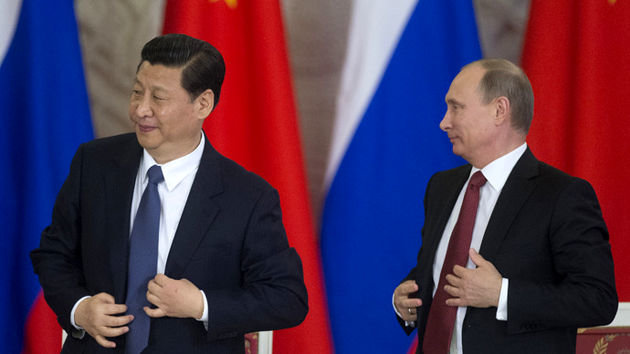Beijing and Moscow Standing against the West

TEHRAN - Russia and China are considered among the important players in the international system. The two countries played a key role in conducting nuclear talks between Iran and the P5+1 members as well.
Although during the nuclear agreement process, there have been differences between Moscow and Beijing and other Western players (on the formulation of a document), but eventually all of the P5 + 1 came to an agreement over the final document of the JCPOA (Joint Comprehensive Plan of Action) in 2015. It's been around two years since the implementation of the nuclear deal between Iran and the members of the P5+1. Over the past two years, we have witnessed the US continuous violations of the nuclear deal, and the silence of European authorities over Washington's violations. In the course of the Joint Commission meeting of the JCPOA (directed by Federica Mogherini), the European Troika also made its utmost to justify Washington's counter-JCPOA measures within the Obama administration and in the Trump government. But, on the contrary, Moscow and Beijing, in public and non-public positions, have repeatedly accused the United States of violating the JCPOA.
Now a short time remains until May 12th, or the deadline put by Trump for taking the final decision on the nuclear deal. Russia and China have taken smart positions in this regard. Beijing and Moscow, on the one hand, have always emphasized that they are completely opposed to making any changes in the content of the nuclear deal and thus, turning it into a new agreement. Moreover, Russian officials have explicitly stated that because of the confidentiality of the talks between the United States and the European Troika, they don't see any reasons to be committed to their final decision.
In recent days, and while the talks over the JCPOA are becoming more and more critical every day, we are witnessing a joint Russian and Chinese signal sent to the European Troika regarding the JCPOA. During a visit to Beijing, Russian Foreign Minister "Sergei Lavrov" agreed with "Wang Yi", his Chinese counterpart to stop the West's efforts in destroying Iran's nuclear deal. In a joint press briefing with China's Foreign Minister in Beijing, Lavrov emphasized that the coherent approach of Russia and China in maintaining alignment with international agreements plays a crucial role in strengthening global stability.
Russia's Deputy Foreign Minister "Sergei Ryabkov", who was Russia's top negotiator in the course of the nuclear talks with Iran, expressed hope that Europe would remain committed to the JCPOA. He said he hopes the European troika would strive to maintain the nuclear deal, and not surrender to the demands of the United States. During a meeting with Iranian Ambassador "Mehdi Sanai" in Russia, Rybkov added that his country's policy remains to be supporting and maintaining the JCPOA, and that no changes is going to be expected in this regard.
The fact is that Ryabkov's recent words are considered as an obvious warning to European officials about their bargain with the United States on the nuclear accord. Over recent months, European authorities including French President "Emmanuel Macron", have given the green light to Trump's administration to play with the JCPOA. Macron was the first European political and executive authority to announce the possibility of a renegotiation over the nuclear deal last summer. He argued that it was possible to re-negotiate with Tehran on issues such as clauses on temporal sanctions against Iran (so-called Sunset clauses), and Iran's missile and regional activities. Meanwhile, Britain and Germany, on the one hand, announced their apparent support of the JCPOA, and, on the other hand, came to an agreement with Trump over changing the nuclear deal.
What is certain is that the European troika has now taken a wrong approach towards the nuclear deal. Instead of concentrating on "restraining Trump", they focused on "dealing with Trump." And this is something that is not hidden from the eyes of the Russian and Chinese authorities. The result of an agreement between the United States and Europe, in the most optimistic situation, would be coming to a second agreement which is in contradiction with the initial agreement. The Associated Press writes in this regard:
Negotiators met for a fourth time last week and made some progress but were unable to reach agreement on all points, according to U.S. officials and outside advisers to the Trump administration familiar with the status of the talks. That potentially leaves the Iran deal's fate to Macron, who will make a state visit to Washington on April 24, and Merkel, who pays a working visit to the U.S. capital on April 27, these people said.
Obviously, if this secondary agreement is formed between the United States and the three countries of France, Britain and Germany, we should wait for a political and legal opposition between Western members of the P5 + 1 and the three countries of Iran, Russia and China. The announcement of their recent positions by Russian and Chinese authorities in support of the original and initial text of the JCPOA is of great importance in this regard. This support shows that in the near future, and in the event of a possible confrontation with the United States and the European troika over the JCPOA, we would be able to count on a joint maneuver with Moscow and Beijing. Undoubtedly, in the near future, and as the secret dimensions of the bargain between the United States and the European troika on the nuclear deal will be uncovered, Washington and the three European players will be held clearly responsible by Beijing and Moscow on violating the nuclear deal. As noted, the membership of Russia and China in the UN Security Council will highlight the role-making of these two Eastern players of the P5+1. Hence we should wait to see a more rigorous Russia and a more serious China standing against the United States and Europe.

Leave a Comment